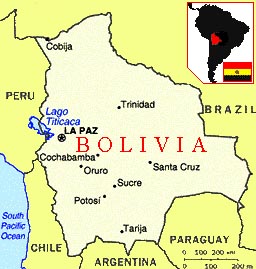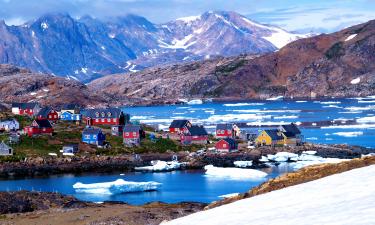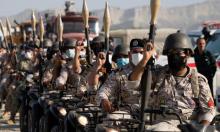Bolivia determined to recover its coastline despite Chile's refusal
 The landlocked South American nation lost 180 miles on the Pacific Ocean that Chile seized in the 1879-83 War of the Pacific. President Carlos Mesa demanded negotiations at the Summit of the Americas in Monterrey, Mexico. Argentina and Venezuela support Bolivia.
The landlocked South American nation lost 180 miles on the Pacific Ocean that Chile seized in the 1879-83 War of the Pacific. President Carlos Mesa demanded negotiations at the Summit of the Americas in Monterrey, Mexico. Argentina and Venezuela support Bolivia.
“Death to Chile!”, cry Bolivian Armed Forces since 120 years ago their country lost the arid 180 miles long strip of Pacific coastline in the War of the Pacific against Chile. Since then both neighbors held tense relations until both governments decided to break off diplomatic ties 26 years ago.
The territorial dispute reignited during a revolt in Bolivia last October that forced conservative and pro-US president Gonzalo Sanchez de Lozada to resign. The protests were caused partly by opposition to the former Bolivian leader's plan to export natural gas (country’s main production) to the United States via Chile.
Last Tuesday, at the Summit of the Americas in Monterrey, northern Mexico, Bolivia's new president Carlos Mesa pushed a demand that neighbor Chile give it land on the Pacific Ocean for its natural gas exports. The bid has been supported by Venezuela's president Hugo Chavez –who said that his dream was to swim in a Bolivian beach- and Argentina.
"We invite (Chilean) President (Ricardo) Lagos and the Chilean government to find with us a definitive solution to our maritime demand," Bolivian President Carlos Mesa told the Summit. Chile, the world's top copper exporter and one of Latin America's most stable nations, refused to discuss the matter. The region claimed by Bolivia –Antofagasta- holds world’s largest copper reserves and the Port of Africa, one of the most active in the region.
"This is not the appropriate forum to invite anyone to debate an issue like the one suggested," replied Chile's socialist president Ricardo Lagos, who offered to restore diplomatic ties but remarked that any solution should mean the “Chilean flag waving” in the disputed area. President Bush and other 31 leaders from the Americas were present at that time.
Washington is concerned on Bolivia's future. Bush discussed the issue separately with Argentine president Nestor Kirchner. The White House worries about the new strongman in the country: the leftist farmer leader Evo Morales. During the meeting with Kirchner, Bush confirmed Mexico and the US will buy Bolivian gas in the amount of $ 150 million and Argentina would invest another $ 50 million to support the weak administration of Carlos Mesa.
Energy companies say Bolivia has enough gas to supply a fifth of California's needs. It has a $6 billion plan to export the gas through Chile or Peru to Mexico and then on to the United States. However, political instability in Bolivia and gas rivals in Indonesia and Peru have dampened optimism that the South American country can recover in the short term.
Hernan Etchaleco
Pravda.Ru
Subscribe to Pravda.Ru Telegram channel, Facebook, RSS!




